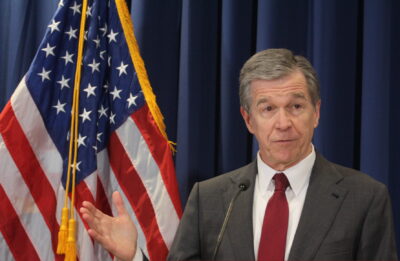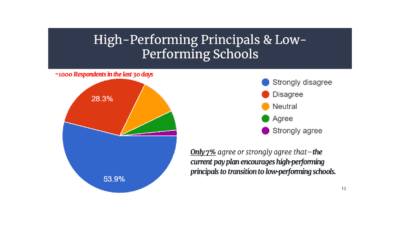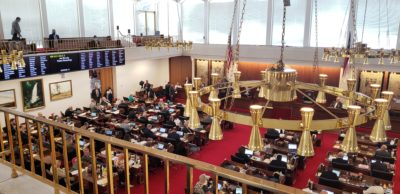
|
|
When Diana Chapman was applying to UNC-Chapel Hill’s Master of Arts in Teaching (MAT) program earlier this year, she knew she eventually wanted to teach in the Wake County Public School System — or leave North Carolina entirely.
The convenience of being close to her family in Raleigh was one factor, but a more important one was pay. Last year, Wake County Schools re-implemented a master’s pay program for teachers in the district: a 10% pay bump for teachers with a master’s degree.
This pay raise was an initiative funded statewide in North Carolina until 2013. Teachers who already had a master’s degree retained their raises, as did any teachers who had already started a master’s program in education or a related field before August 1, 2013 — but anyone who began their program after that date did not receive the higher pay.
The program was discontinued at the state level that year because of studies demonstrating that teachers with master’s degrees aren’t more effective at raising student test scores than teachers without them.
But to future teachers like Chapman, test scores aren’t the only way she sees herself measuring student success — and her own skills in the classroom — after she graduates with her MAT.
“I think there’s a lot more merit to be said about getting a master’s degree than teacher effectiveness via student test scores in the classroom,” Chapman said.
Education funding in North Carolina
Last March, Wake County’s school board voted to reinstate the 10% pay bump for teachers with master’s degrees using local recurring funds.
Elena Ashburn, the central area superintendent at Wake County Schools, didn’t work directly on the proposal, but fully supports it. She said master’s pay compensates qualified teachers for an increased level of professionalism they bring to the classroom.
“We have a lot of staff who have committed to this work that have their master’s degree — that are, quite frankly, going to do this work, even if they didn’t get this 10% raise,” Ashburn said. “So on the one hand, it rewards, it helps retain, it helps professionalize the people that we already have that are doing such incredible work in our schools.”
The other reason for the salary bump was to help recruit new teachers, Ashburn said.
For teachers in Wake County already grandfathered into the program, there weren’t any salary changes. But with the pay bump, a new teacher with a master’s degree would be making almost $400 a month more, according to North Carolina’s 2023-2024 State Salary Schedules.
In North Carolina, public school teachers are paid a base salary from the state dependent on years of experience. In the 2023-2024 school year, a first-year teacher earned $39,000 annually, while a teacher with 15 years of classroom experience earned $52,060 as their base pay.
That number can increase based on bonuses for classroom achievement and local supplements that range widely between districts. The average supplement is just over $5,000, but some counties don’t have a local supplement at all.
Before reintroducing the master’s pay program, Wake County’s average teacher supplement was $8,670 — the second-highest in the state in 2021-22, according to a BEST NC report on teacher pay.
Because these extra funds come from local dollars, lower-wealth counties typically aren’t able to offer as high of a supplement. The state legislature created the Teacher Supplement Assistance allotment in 2021 to try to address this problem.
If other districts wanted to re-implement a master’s pay program, they wouldn’t necessarily have the money to, unless the funds came from the state.
“Our rural counties can’t do that kind of supplemental pay program that our urban counties are doing,” said Susan Book, one of the co-founders of Save Our Schools NC. “And so we see great inequities in teacher pay across the state, which I find concerning.”
Paths to teaching with a master’s
The master’s degree in history Katie Bollinger received from American Military University in 2010 meant she was eligible for North Carolina’s master’s pay program when she started teaching middle school in Wake County in 2011.
She taught primarily social studies and science classes, and also a few in language arts, during her 12 years in Wake County. But because her degree was in history — and not a master’s in education or a master’s in teaching — she was more constrained in how that pay was applied.
“I actually had to teach my subject matter to get that pay,” Bollinger, who now teaches in Onslow County Schools, said. “Because if I were to teach anything less than 50% social studies, I would not get that master’s pay.”
Master’s pay programs offering raises to teachers with advanced degrees are popular throughout the rest of the country — North Carolina was the first state to eliminate the program in 2013. About 90% of the largest districts in the country have some kind of incentive for teachers with master’s degrees, according to the National Council on Teacher Quality’s Teacher Contract Database.
Critics of master’s pay programs claim that master’s pay only incentivizes getting a degree, not being a better teacher.
When the statewide program was in place, the master’s degree received had to be content-specific to a teacher’s subject area — like Bollinger’s — or in education.
That meant a teacher could get an advanced degree in School Administration, for example, for the sake of the master’s pay bump, but then go straight back to the classroom — where the skills they built during the graduate degree weren’t necessarily being applied to make them more effective educators.
In other cases, a master’s degree is how a future teacher gets their teaching license after an undergraduate degree in another subject — like Chapman, the future MAT student, who will graduate from UNC-CH in May with a degree in English and a minor in education.
UNC-CH does not have an undergraduate education major where students graduate with a teaching license. For UNC-CH students, a master’s degree — or an external program like Teach for America — is a natural next step toward a career in teaching.
While Chapman has both content-specific and teaching knowledge from her minor going into the MAT, Frank Forcino — the director of the science education program at Western Carolina University — said that’s not always the case.
“Folks that are trying to get in [Western’s] MAT program don’t have that content knowledge as often as they used to,” Forcino said. “And that is typically not as good for the students because in order to, you know, explain content, teach content, you really do need to have a deep understanding of it.”
Students who come into the MAT from other disciplines or careers don’t always have the opportunity to develop a pedagogical background — and because so much of the MAT structure is in the classroom, it can feel like they’re just being thrown in the deep end, Forcino said.
“They are learning how to be a teacher by being a teacher,” Forcino said. “They don’t have any training when they start and they’re getting this training as they go, while they’re being overwhelmed with being a first-time teacher.”
He said it’s hard to generalize which route leads to “better” teachers because there are so many factors affecting teacher effectiveness and student success in the classroom.
Forcino, though, almost always recommends a four-year education degree over just a MAT to the students he advises at Western. Even if it takes an extra semester of a student’s undergraduate career, there is much more time for a future teacher to develop both content-specific knowledge and learn teaching methods, he said.
But that’s the route that wouldn’t get a teacher a pay bump with a master’s pay system in place.
Beyond master’s pay
Since accepting admission to UNC-CH’s MAT program, Chapman has changed her mind about Wake County Schools. As someone who eventually wants to teach future teachers in a higher education setting, she thinks the experience of teaching in different districts in North Carolina will be valuable for her future career.
And the scholarships she’s gotten from UNC-CH mean she now knows she won’t have to worry about student loans going into her teaching career.
“But I think that for a while, I was definitely looking around, like, ‘Where can I live comfortably, and not have to eat ramen every day?’” Chapman said.
Bollinger now teaches at a middle school in Onslow County. She makes less there than she did during her years in the Wake County Public School System, but the rapidly rising cost of living in the Triangle area was too much for her to sustain on a teacher’s salary, she said.
The base pay for a new teacher will increase to $41,000 for 2024-2025 school year, due to raises approved in the North Carolina General Assembly’s most recent budget.
But, according to Forbes, the average two-year master’s program in the United States costs almost $40,000. UNC-CH’s MAT costs roughly $13,000 in tuition for the yearlong program, with Duke University’s MAT running closer to $50,000 — more than the starting teacher base salary.
Tara Wojciechowski, a chemistry teacher at Wake County High School, has reached the top of the North Carolina teacher pay scale — which caps at 25 years — with her 27 years in Wake County classrooms. Even so, for her, it’s never been about the dollar figure she brings home.
“It’s not about the pay, necessarily — I mean, if you have a partner that makes a decent amount of money, anyway,” Wojciechowski said. “I feel bad for all the single teachers out there.”
Wojciechowski said she has never felt the need to get her master’s degree — partially because of her financial situation, but also because she has her National Board Certification — which comes with a 12% pay bump paid out at the state level.
To be National Board-certified, teachers who have been in the classroom for at least three years to “demonstrate standards-based evidence of the positive effect they have on student learning,” according to the National Board website.
Research has demonstrated National Board certification is correlated with student achievement, but high-poverty districts have a much lower percentage of certified teachers.
According to a 2023 BEST NC report on teacher pay, just 5% of teachers at the highest-poverty schools are National Board-certified, compared with nearly triple that in the most well-off districts — presumably, at least in part, because of temptingly higher salaries in those districts.
Forcino said in his eight years teaching at Western, there have been only a few students who have stayed in the area to teach after graduating. Most of them, he said, have headed back to where they’re from, or to Raleigh and Charlotte for those more competitive salaries. Others have left to go to Georgia, South Carolina or even further away.
Keeping salaries competitive, by whatever means, is essential for ensuring there are qualified teachers in North Carolina classrooms, he said, but there’s more to it. Forcino said if parents and administrators are making teachers’ lives more difficult, that hardly incentivizes them to remain in a classroom, much less advance their professionalism with a degree.
“We need to pay teachers more — that’s the definitive fact. We need to pay them a competitive salary,” Forcino said. “But aside from that, the other key factor that goes into ensuring teachers stay in the field is giving them support, making them feel valued in their career.”





